From agent to revolutionary…Word is Hugo Weaving has replaced James Purefoy as the lead in V for Vendetta. I must say, that casting switch makes this project considerably more exciting.
Tag: The Wachowskis
Gimme a V.
A thespian-terrorist connection? The upcoming film version of Alan Moore’s V for Vendetta receives an infusion of grade-A British talent, including Stephen Fry, John Hurt, Tim Pigott-Smith, and Sinead Cusack. (They join James Purefoy, Natalie Portman, and Stephen Rea.)
The Bombing Game.
Stephen Rea joins the Wachowskis’ take on V for Vendetta (with James Purefoy and Natalie Portman.) Unfortunately, according to Newsarama‘s Rich Johnston, the movie’s taking a few detours away from Alan Moore’s series. Given the terrorist protagonist, I’m dismayed, but not surprised. (2nd link via Ed Rants.)
Blue (and Red) Crush.
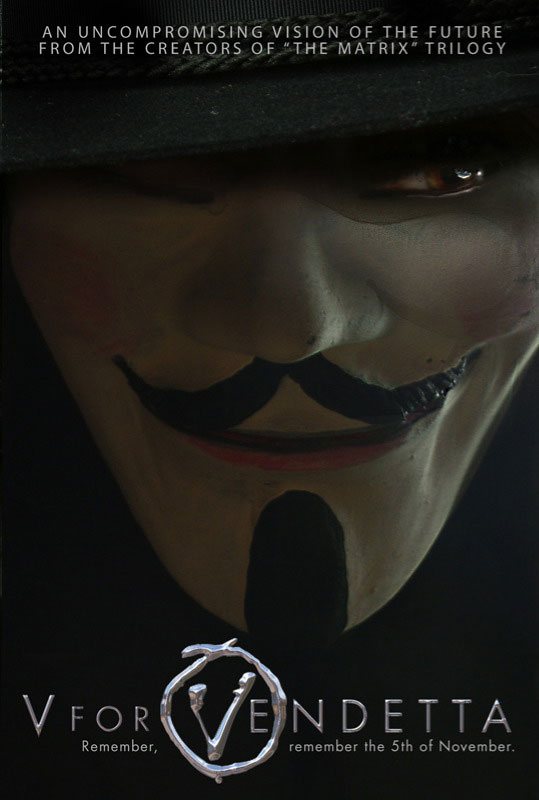 In the fanboy casting department, Kate Bosworth is set to play Lois Lane in Bryan Singer’s forthcoming Superman, while Natalie Portman purportedly joins V for Vendetta. Bosworth doesn’t scream Lois to me, but she’s talented (and, obviously a looker) and I’m sure she’ll do well. As for V, I could see it going either way at this point, although I do like the teaser poster (at right). Update: Regarding Superman, it’s official: Spacey is Lex.
In the fanboy casting department, Kate Bosworth is set to play Lois Lane in Bryan Singer’s forthcoming Superman, while Natalie Portman purportedly joins V for Vendetta. Bosworth doesn’t scream Lois to me, but she’s talented (and, obviously a looker) and I’m sure she’ll do well. As for V, I could see it going either way at this point, although I do like the teaser poster (at right). Update: Regarding Superman, it’s official: Spacey is Lex.
D for Don’t Blow It.
Another classic Alan Moore property moves to the big screen as Matrix and Star Wars AD James McTeigue takes the reins of V for Vendetta. I haven’t read V in over a decade, but I remember it as being rather dark and political. Well, let’s hope it’s more From Hell than LXG. Is Miracleman next?
3.1.
 Digital Bits releases the details of a new Matrix trilogy box set. As y’all might remember, I was cautiously positive about Reloaded and really down on Revolutions, but this box set sounds like hella fun. “There will be two audio commentaries for each film – one from philosophers Ken Wilber and Cornel West (who analyze the meanings behind the films), and one from three professional critics who hated all three films (no names given). According to Andy Wachowski, ‘It’s the best idea we’ve ever had. It’s hilarious. They just sit there and rip the s**t out of us for six hours.'”
Digital Bits releases the details of a new Matrix trilogy box set. As y’all might remember, I was cautiously positive about Reloaded and really down on Revolutions, but this box set sounds like hella fun. “There will be two audio commentaries for each film – one from philosophers Ken Wilber and Cornel West (who analyze the meanings behind the films), and one from three professional critics who hated all three films (no names given). According to Andy Wachowski, ‘It’s the best idea we’ve ever had. It’s hilarious. They just sit there and rip the s**t out of us for six hours.'”
2003 in Film.
Well, it’s that time of year again, New Year’s Eve. So, without further ado…
[2000/2001/2002]
1. Lord of the Rings: Return of the King. If you didn’t see this pick coming, welcome to GitM. Ever since this blog started four years ago, I and it have been breathlessly awaiting Peter Jackson’s trilogy, and, boy, he delivered in spades. Even in spite of the pacing problems mandated by the TE running time, Return of the King is a marvel, the perfect ending to this epic for the ages and easily the best third-movie in a series ever. There’s so many ways these films could’ve turned out atrociously. (To take just three examples, think Brett Ratner doing the Pullman books, or the Wachowskis faltering on the early promise of The Matrix, or how Chris Columbus has made the magical world of Harry Potter so four-color monotonous.) The fact that they didn’t — that they instead shattered all expectations while staying true to Tolkien’s vision — is a miracle of inestimable value. In the post-Star Wars age, when epics have been replaced by “blockbusters,” and most event movies have been hollowed-out in advance by irony, excessive hype, dumbing-down, and sheer avarice, Peter Jackson has taught us to expect more from the cinema once again. Beyond all imagining, he took the ring all the way to Mordor and destroyed that sucker. So have fun on Kong, PJ, you’ve earned it.
2. Lost in Translation. It was fun for a while, there was no way of knowing. Like a dream in the night, who can say where we’re going? I still think Sofia Coppola cut a little close to the bone here in terms of autobiography, particularly given her recent split with Spike Jonze. Still, I find this tale of chance encounters and foreign vistas has a strange kind of magic to it, and it has stayed with me longer than any other film this year. Bill Murray comes into full bloom in a part he’s been circling around his entire career, and while I suspect he’ll get some stiff competition from the Mystic River boys come award-time, I’d say he deserves the Oscar for this one. Lost in Translation has its problems, sure, but at it’s best it’s haunting, ethereal, and touching like no other film in 2003.
3. Intolerable Cruelty. I expect I’ll be in the minority on this pick – This more-mainstream-than-usual Coen joint only got above-average reviews, and hardly anyone I’ve spoken to enjoyed it as much as I did. Still, I thought Intolerable Cruelty was a pop delight, 99.44% pure Coen confection. George Clooney is used to much better effect here than in O Brother (gotta love the teeth thing), and everyone else seems to be having enormous amounts of fun along the way. Light and breezy, yeah, but I thought it was that rare breed of romantic comedy that actually manages to be both romantic and hilarious. In the post-Tolkien era, it’s good to know we can always rely on the Coens for consistently excellent work, and I for one am greatly looking forward to The Ladykillers.
(3. The Pianist.) A 2002 film that I caught in March of this year, The Pianist is a harrowing and unique survivor’s tale that’s hard to watch and harder to forget (and I can’t have been the only person who thought post-spider-hole Saddam bore a passing resemblance to Brody’s third-act Szpilman.) Speaking of which, I said in my original review of Adrien Brody that “I can’t see the Academy rewarding this kind of understatement over a scenery-chewing performance like that of Daniel Day-Lewis in Gangs of New York.” Glad to see I was wrong.
4. Mystic River.: The waters of the Charles are disturbed, something is rotten in the outskirts of Boston, and it’s safe to say the Fates are wicked pissed. Much like In the Bedroom in 2001 (and Clint Eastwood’s own earlier Unforgiven), Mystic River is inhabited and propelled by a spirit of lumbering, impending, inexorable doom…what Legolas might call a “sleepless malice.” It is that existential malice, rooted so strongly in local color, that gives this River its considerable power. And unlike Cold Mountain, where stars stick out here and there with showy turns, the ensemble cast of Mystic River never overwhelm the strong sense of place at the heart of the film — indeed, they sustain it with consistently excellent and nuanced performances. Big ups for all involved, and particularly Tim Robbins and Marcia Gay Harden.
5. X2: X-Men United. Laugh if you want, but I can’t think of any other movie where I had more fun this year. Arguably the most successful comic film since Superman 2, X2 improved over its rather staid predecessor in every way you can imagine. From Nightcrawler in the White House to the assault on the mansion to Magneto’s escape to Ian McKellen and Brian Cox chewing the scenery in inimitable fashion, X2 was ripe with moments that seemed plucked directly out of the comics, if not straight out of the fanboy id. To me, my X-Men.
6. Master and Commander: The Far Side of the World. It’s a long title, it’s a long movie. But a good kinda long…in fact, as I said in my initial review, it seemed to move to the langorous rhythms of a long sea voyage, one that I may not take again for awhile, but one that I still thoroughly enjoyed. And I’ll say this for Russell Crowe…somewhere along the way in each of his films, I tend to forget that he’s Russell Crowe. His Capt. Jack Aubrey was no exception.
7. The Matrix Reloaded. If we can, let’s try to forget the resounding thud on which the Matrix trilogy ended. For a time there, five short months, the fanboy nation was abuzz in trying to figure out exactly where the Wachowskis were going after the second chapter. Previous Matrices, previous Ones? How was Neo manipulating the real world? What was Smith up to? It all seems kinda pedestrian now, of course, but at the time Reloaded was a sequel that outdid its predecessor in pizazz while building on the questions that animated the first film. I won’t defend the first forty-five minutes or the ridiculous rave scene. But, right about the time Hugo Weaving showed up to do what he does best, Revolutions found a new gear that it maintained right up until the arc-twisting Architect monologues at the end. And, as far as action sequences go, it’s hard to beat the visceral thrill of the 14-minute highway chase.
(7. The 25th Hour.) Another 2002 hold-over, and the best film yet made about the aftermath of 9/11, (which only seems natural, given that it’s by one of New York’s finest directors.) Haunted by might-have-beens, what-ifs, and what-nows, The 25th Hour feels real and immediate in its attempt to grapple with both 9/11 and the slamming cage in Monty Brogan’s future. Only once, with the Fight Club-like fracas in the park, does the film flounder. Otherwise, it’s a thought-provoking meditation throughout.
8. The Last Samurai: Breathtaking New Zealand landscapes, furious suicide cavalry charges, rustic untainted pre-modern villages…no, it’s not Return of the King, just the warm-up. [And, as I said earlier, I prefer my anti-modern nostalgia hobbit-like (peaceful, environmental, epicurean) rather than samurai-ish (martial, virtuous, stoic)] While I think Cold Mountain got the Civil War right, I ultimately found this film to be the more engaging historical epic of December 2003. So take that, Miramax.
9. Finding Nemo. Oh, my…I almost forgot about Nemo. (Just like Dory sometimes.) Pixar’s films have been so consistently good that there’s a danger of taking them for granted. They hit another one out of the park in this tale under the sea. As with the Toy Stories and Monster’s Inc. before it, just an all-around solid kid’s movie filled to the brim with eye-popping wonders.
10. Dirty Pretty Things. Although it becomes more conventional as it goes along, DPT starts very well, features a star-making turn by Chiwetel Ejiofor, and manages to include a Audrey Tautou performance that isn’t fingernails-on-the-blackboard bothersome. As with Hugh Grant in About a Boy last year, that deserves plaudits if nothing else.
11. L’Auberge Espagnole. Hmm…two Tautous in a row….perhaps I should stop playa-hatin’. At any rate, while Lost in Translation trafficked in existential detachment, L’Auberge Espagnole showed the fun Scarlett Johannson could’ve been having, if she’d just lighten up and get out of the hotel once in awhile. This paean to the pan-Continental culture of the EU captured the excitement and possibilities of youth in a way that was both sexier and funnier than any of the teen shock-schlock emanating from our own side of the pond. Road Trippers, take a gander.
12. The Quiet American. A bit by-the-numbers, perhaps, but Phillip Noyce’s take on Graham Greene’s novel was blessed with timeliness and two great performances by Michael Caine and Brendan Fraser, both of whom expertly exemplified their homelands’ diplomatic tendencies without becoming overly tendentious. I’m not sure if giving away the end before the credits was the right way to go, but otherwise the film rarely falters.
13. The Fog of War. From Alden Pyle to one of his real-life counterparts, Robert McNamara, who now only remains quiet when questioned about his own culpability over Vietnam. Despite this central failing, a spry McNamara succeeds in penetrating the fog of time to examine how he himself became lost in the maze-like logic of war. If you can withstand the frequent Phillip Glass-scored barrages, it’s worth a see.
14. Pirates of the Caribbean. My initial upbeat opinion on this one has faded somewhat over the autumn and winter months. Still, at the time PotC was a surprisingly good summer popcorn flick, and rollicking fun for about two of of its two and a half hours. Johnny Depp and Geoffrey Rush were great fun, Keira Knightley and Orlando Bloom make for great eye candy, and Sam Lowry was in it. I’m just going to assume it was much, much better than The Haunted Mansion.
15. The Station Agent. Ok, it’s got Sunday afternoon bored in front of the IFC Channel written all over it. And not much happens for the last forty minutes or so. Still, The Station Agent proves that if you write a few interesting, well-rounded, complicated characters and throw them in a situation together, the story almost writes itself.
16. American Splendor. The first of a couple of movies that I seemed to like less than most people. Sure, I thought Splendor was well-done, but it never really grabbed me, and I’d be more impressed by its breaking-the-fourth-wall daring if it hadn’t already been done twenty-five years ago in Annie Hall. (Similarly, I thought this kooky underground comic world was captured better in Crumb.)
17. Spellbound. Could you use it in a sentence? Again, people seemed to love this flick, and I was definitely entertained by it. But, when you get right down to it, what we have here is kids spelling for two hours…I couldn’t imagine ever sitting through this one again. And, as I said in my original post, I thought Spellbound was more manipulative than it lets on. Less kids and more complexity would’ve made the film more satisfying. S-A-T-I…
18. Cold Mountain. I’ve already written about this one at length today, so I’ll just refer you to the review. To sum up, occasionally beautiful but curiously uninvolving and way too top-heavy with star power distractions.
19. 28 Days Later. Great first third, ok second third, lousy finish. The film was much more interesting before our team makes it to Christopher Eccleston’s countryside version of Apocalypse Now. And I can’t stand horror movies where the protagonists make idiot decisions, like driving into tunnels for no reason or taking downers when surrounded by flesh-eating, spastic zombies. But the cast — particularly Brendan Gleeson — do yeoman’s work, and the opening moments in an empty London are legitimately creepy.
20. T3: Rise of the Machines. Before he was the Governator, he was the T-1000 one (last?) time. Let’s face it, this movie is mainly here by virtue of not being bad. I mean, c’mon, it was better than you thought, right? Well, me too. Claire Danes was insufferable, but Nick Stahl and Kristanna Loken give it the ole college try, and the story takes a few jags that weren’t immediately apparent. Bully to Jonathan Mostow for not running James Cameron’s franchise into the ground.
As Yet Unseen: 21 Grams, Bad Santa, The Cooler, House of Sand and Fog, In America, Love, Actually, Something’s Gotta Give.
Best Actor: Bill Murray, Lost in Translation. Sean Penn, Mystic River. Chiwetel Ejiofor, Dirty Pretty Things. Michael Caine, The Quiet American.
Best Actress: Scarlett Johannson, Lost in Translation (who’s sort of here by default…I expect competition from Diane “Something’s Gotta Give” Keaton, Samantha “In America” Morton, Jennifer “House of Sand and Fog” Connolly, and Naomi “21 Grams” Watts.)
Best Supporting Actor: Tim Robbins, Mystic River, Sean Astin, Return of the King, Billy Boyd, Return of the King, Ken Watanabe, The Last Samurai.
Best Supporting Actress: Renee Zellweger, Cold Mountain, Marcia Gay Harden, Mystic River, Patricia Clarkson, The Station Agent.
Worst Films: 1. Gods and Generals, 2. Dreamcatcher, 3. Scary Movie 3. 4. Underworld.
Worst Disappointments: 1. The Hulk, 2. The Matrix: Revolutions, 3. Kill Bill, Vol. 1.
Ho-Hum: 1. LXG, 2. Bubba Ho-Tep, 3. Big Fish, 4. Masked and Anonymous. 5. Tears of the Sun. 6. Veronica Guerin, 7. The Core.
Attack of the Clone.
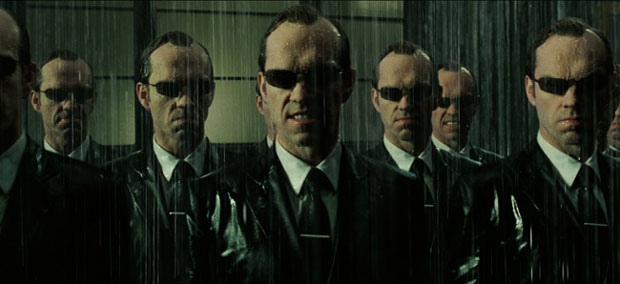
UGH. Well, the keyboard just fell to the ground and I lost a really long Matrix: Revolutions review in one errant keystroke. As Neo might say, “Whoa.” So here we go again…Spoilers to follow throughout.
Like most of the fanboy world, I checked out Revolutions on Wednesday and, well, I guess Andrew O’Hehir of Salon might’ve said it best: It “isn’t a terrible movie, but it is a tremendous disappointment.” (Many people I’ve spoken to think that even this proclamation is being charitable.) As y’all may or may not remember, I actually liked The Matrix: Reloaded, and forgave it many of its considerable faults (the interminable first forty minutes in Zion, for example), because I assumed that much of the drier, talkier scenes were necessary for setting the stage for the final installment. And I thought that the Architect scene that closed Reloaded also opened many intriguing doors that promised future mind-bending plot twists in Revolutions.
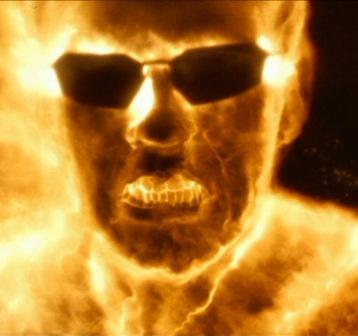 But, sadly, Revolutions capitalizes on barely any of this promise. Instead the Wachowski, um, siblings give us a closing chapter that is almost breathtaking in its inanity. For one, much of the time spent in Reloaded making the Merovingian (Lambert Wilson), Persephone (Monica Bellucci), and for that matter, the phase-shifting albino twins (“We are getting very aggravated”) decently compelling adversaries seems to have been completely wasted. None of Merv’s existential menace or Persephone’s prophetic allure comes to anything here — instead, they’re used as throwaway devices to set up an exchange in a goofy S&M joint which I suppose is meant to approximate Hell but comes off more like the Prague nightclub in Blade 2. As with the characters, so with the plot twists — Virtually every one of the intriguing questions dropped at the end of Reloaded (multiple Matrices, Neo’s real world powers) are either completely left by the wayside or just accepted by the story — Neo has powers in the Real World now because he does. Hmm, that’s not that interesting. It eventually seems that the only point of the film’s first half-hour (aside from the introduction of karmic programs, which I’ll get to later) is to rectify the Neo-in-a-coma cliffhanger of Reloaded, a cliffhanger that ends up having little or nothing to do with the trilogy’s main arc.
But, sadly, Revolutions capitalizes on barely any of this promise. Instead the Wachowski, um, siblings give us a closing chapter that is almost breathtaking in its inanity. For one, much of the time spent in Reloaded making the Merovingian (Lambert Wilson), Persephone (Monica Bellucci), and for that matter, the phase-shifting albino twins (“We are getting very aggravated”) decently compelling adversaries seems to have been completely wasted. None of Merv’s existential menace or Persephone’s prophetic allure comes to anything here — instead, they’re used as throwaway devices to set up an exchange in a goofy S&M joint which I suppose is meant to approximate Hell but comes off more like the Prague nightclub in Blade 2. As with the characters, so with the plot twists — Virtually every one of the intriguing questions dropped at the end of Reloaded (multiple Matrices, Neo’s real world powers) are either completely left by the wayside or just accepted by the story — Neo has powers in the Real World now because he does. Hmm, that’s not that interesting. It eventually seems that the only point of the film’s first half-hour (aside from the introduction of karmic programs, which I’ll get to later) is to rectify the Neo-in-a-coma cliffhanger of Reloaded, a cliffhanger that ends up having little or nothing to do with the trilogy’s main arc.
Speaking of the main arc, I’d think even the most rabid Matrix fanatics out there have to admit that almost all of the fanfic endings to Revolutions turned out to be more intriguing and well-thought-out than the real thing. Now I don’t have a problem with the peace treaty aspect of the conclusion – after watching the Animatrix prequels, that seemed almost inevitable. But, as J. Hoberman noted in a mixed-positive review, what we end up with here is one-part Christ allegory (perhaps Mel Gibson should’ve taken the role), one-part Return of the King, with Neo and Trinity rushing to Mordor before the White City falls. There are no interesting permutations to this formula along the way, no Matrix-like plot twist to take the film up a notch — instead Revolutions just grinds along inexorably to its rote conclusion. It would’ve been well nigh impossible for the Wachowskis to match the shock of Neo’s pod awakening in the first Matrix, but I think they could’ve approximated something along the lines of the Architect scene if they’d just tried a little harder.
Moreover, Revolutions as written fails to engage us in the characters we’ve been following along the way. One of the main three is reduced to little more than a Nien Nunb impression, while another dies (slowly) in what amounts basically to a Keymaker-like chauffeuring mission. Instead, we spend most of the movie watching the exploits of a Zion filled with uninvolving stock character tropes — the can-do kid, the grizzled sergeant, the take-no-guff officer, the scrappy girlfriend — take your pick. Frankly, the Wachowskis should be ashamed at the depths of cliche wallowed in here, in both the dialogue and the characters. Just grisly stuff.
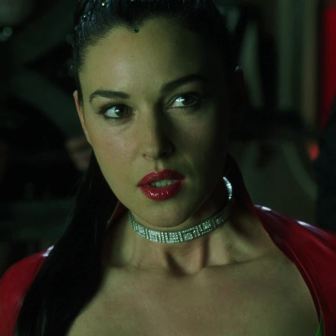 So why, after all these issues, am I still giving Reloaded a 2-star (6/10) review? Well, for one, I guess I am a sucker for big sci-fi spectacle, and the Zion invasion sequence does undoubtedly make for some compelling eye candy. It’d have been nice if the machines had relied on a variety of military mechs rather than just the ubiquitous Squiddies, but they are kinda creepy, and I did like the moment when they pour out of the dock breach like the blooming of a poisonous rose. And then there’s Agent Smith, who as per usual steals scenes every time he opens his mouth — His scene with the Oracle may be the high point of the film. Hugo Weaving (and Ian Bliss’s wicked Weaving impression) deserve high marks for bringing the type of grade-b, meglomaniacal fun to the table that this ponderous film so often needs (More Joe Pantoliano would’ve benefited both sequels too, I should think.) Alas, the rain battle between Smith and Neo at the end of the film also feels like a bust. It’s never as engaging as their fracas at the end of the first Matrix, and it definitely could have benefited from more Superman stylings (punching through buildings, swinging streetlamps like baseball bats, etc.)
So why, after all these issues, am I still giving Reloaded a 2-star (6/10) review? Well, for one, I guess I am a sucker for big sci-fi spectacle, and the Zion invasion sequence does undoubtedly make for some compelling eye candy. It’d have been nice if the machines had relied on a variety of military mechs rather than just the ubiquitous Squiddies, but they are kinda creepy, and I did like the moment when they pour out of the dock breach like the blooming of a poisonous rose. And then there’s Agent Smith, who as per usual steals scenes every time he opens his mouth — His scene with the Oracle may be the high point of the film. Hugo Weaving (and Ian Bliss’s wicked Weaving impression) deserve high marks for bringing the type of grade-b, meglomaniacal fun to the table that this ponderous film so often needs (More Joe Pantoliano would’ve benefited both sequels too, I should think.) Alas, the rain battle between Smith and Neo at the end of the film also feels like a bust. It’s never as engaging as their fracas at the end of the first Matrix, and it definitely could have benefited from more Superman stylings (punching through buildings, swinging streetlamps like baseball bats, etc.)
But I’m trying to accentuate the positive here. I did enjoy the Philosophy 102 lectures, even if they also seem inserted in as usual. To add to the existential and behaviorist disquisitions of Reloaded, we now have an emotive program discoursing on karma (also one of the better moments of the film) and Smith making a case for nihilism. You could read Neo’s final fate as representing the necessity of all philosophies to grapple with the inevitability of death, although it seems more pertinent to explain it as simple messiah martyrdom, given all the throwing around of words like “faith” and “belief” through the film. (The kid’s “I believe in Neo!”, for example…ugh.) Actually, trying to interpret the ending of the film brings me to my biggest problem with Revolutions: the movie turned out to be so pedestrian in its execution that it almost undercuts the intellectual legitimacy of the earlier films.
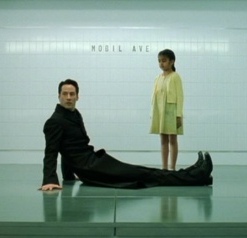 Put another way, while I think David Denby should be taken to task for the ridiculous snobbishness exposed in his Revolutions review (Denby writes that it is “far too late to bemoan the obvious truth that…college-educated gents, and millions of others like them, will spend many hours debating the apocalypse as revealed by the Brothers Wachowski but would die before reading a single story by Chekhov or Cheever dealing with the sensual and spiritual quandaries of ordinary people“), the film does suggest that much of the philosophical ruminations on the meaning of the Matrix trilogy may have been misplaced when the writer-directors are so glib and ham-handed as to finish it off with a mighty dollop of Christ-figure bathos, a sunset, and a little girl.
Put another way, while I think David Denby should be taken to task for the ridiculous snobbishness exposed in his Revolutions review (Denby writes that it is “far too late to bemoan the obvious truth that…college-educated gents, and millions of others like them, will spend many hours debating the apocalypse as revealed by the Brothers Wachowski but would die before reading a single story by Chekhov or Cheever dealing with the sensual and spiritual quandaries of ordinary people“), the film does suggest that much of the philosophical ruminations on the meaning of the Matrix trilogy may have been misplaced when the writer-directors are so glib and ham-handed as to finish it off with a mighty dollop of Christ-figure bathos, a sunset, and a little girl.
In sum, while the intriguing but flawed Reloaded suggested that the Wachowskis were going to swing for the fences in the final installment, ultimately it seemed that — action spectacle aside — they were content to settle for a bunt. Boo hiss.
Free Agents.

The Matrix publicity folks release the Revolutions posters. Very nice, although the goofy tagline – “Everything that has a beginning has an end” – smacks of the quasi-deep philosophizing that almost derailed the last film.
She’s got legs,
and She knows how to use them. The hour is finally at hand…Tomorrow the RotK trailer appears in front of Secondhand Lions (online Monday), and here’s what we’ll see. (Some screencaps here.) Update: Snippets of footage here, including an ethereal and jaw-dropping look at Minas Morgul. Come, Master, come to Smeagol… Update 2: The Wachowskis get in the game with the full Matrix: Revolutions trailer…A sci-fi sorbet before the fanboy main course. Update 3: A bootleg version of the trailer is now available, and it should hold ya until Monday.
